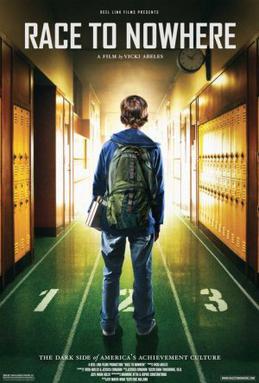Nearly 200 parents, teachers, administrators and community members filled the Pollard auditorium on October 19th to watch a screening of Race to Nowhere. The film, which was funded by a NEF grant, examines the culture of over-scheduling, over-testing and over-pressuring children. It “reveals an education system in which cheating has become commonplace; students have become disengaged; stress-related illness, depression and burnout are rampant; and young people arrive at college and the workplace unprepared and uninspired.”
The film was introduced by Tamatha Bibbo, Principal at Pollard Middle School, who said that the new STRETCH Block is one way Pollard is trying to take some pressure off of kids during the school day. STRETCH classes meet for 6 weeks, twice a week, for 30 minutes each, and offer students the opportunity to “stretch their skills and competencies through enriching activities, and explore interests without the pressure of homework or assessments.”
After the film concluded, a panel of four educators took questions. Parents were curious what the Needham Public Schools are doing to address the issues presented in the film—especially considering it was released in 2010. Michael Goodin, Founder of the Rivers and Revolutions Program at Concord-Carlisle High School, reminded the audience that “seven years is just a blip in the education system. It’s going to take years and years to change things.” Lisa Fiore, Professor of Developmental and Educational Psychology at Lesley University, recommended that parents attend school committee meetings to let their concerns be known.
All agreed that professional development is one key to exploring the topics that were addressed in the film. Aaron Sicotte, Principal of Needham High School, said that the longer school day is enabling teachers at the high school to meet once a week.
The amount of homework was also a topic of conversation. Sicotte commented that homework is something “we’re continuing to talk about.” Parents and teachers need to consider, however, “If a child is taking six hours on homework, have we chosen the right class for him or her?”
Jimmy Odierna, Interdisciplinary Learning Specialist and Co-Founder of the Greater Boston Project at Needham High School, commented that the district is starting to focus more on growth mindset. Teachers of the Greater Boston Project have changed the rubric to include assessments on how much a student has grown and how a student has rebounded after dealing with a setback.
The pressure to achieve and attend the top colleges was a recurring theme throughout the movie. Odierna said “We, as a community, still push the top schools … Do kids need to go to an Ivy League school to be successful? Of course not.” He also stressed that NPS are focusing more on social-emotional learning and project-based learning. Sicotte added, “It’s a hard balance because we have a state and nation that has high expectations, and the town of Needham pays a lot of attention to MCAS and SAT scores.” “How do we make sure we have healthy kids?” he asked. “As parents, it’s important to know your kids and find a path that makes sense for them, and that path won’t necessarily be the one your neighbors are following.”

